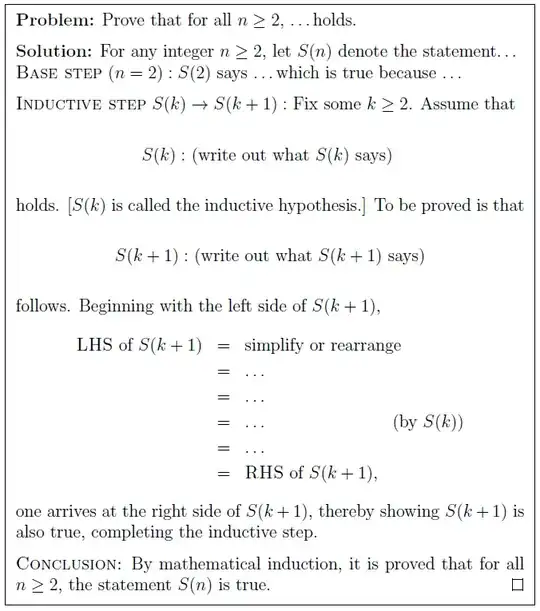Initial comment: First of all, +1 for effort. Your questions almost always show a lot of it. Also, I can see you are trying to actively improve based on questions like this, where you are clearly trying to implement the advice given by users on here. That's great. Based on several of your questions, your induction ones anyway, it seems that one of the chief struggles you have is in actually writing the proof well (that is, making it clear, polished, etc.). Thus, at the end of this post, I'll provide you with a template for writing induction proofs adapted from David Gunderson's Handbook of Mathematical Induction (something tells me you would really like this book by the way). It helped me immensely when I was starting out.
General case of your problem: Fix $r\in\mathbb{R}, r\neq 1$, and for $n\geq 1$, let $S(n)$ denote the statement
$$
S(n) : 1+r+r^2+\cdots+r^n=\frac{r^{n+1}-1}{r-1}.\tag{1}
$$
Your specific problem is solved by setting $r=2$ in $(1)$. I actually proved $(1)$ by induction some time ago, but I cannot seem to find that question (either it was deleted or I simply cannot find it). Regardless, you should at least know that your problem is really an instance of a more general scenario.
Your specific problem: I am going to provide what I think is a nice write-up for your exact problem (note: only read on if you want the full solution). My main reason for providing it is to show you how a well-written proof would look (IMO anyway).
For $n\geq 0$, let $S(n)$ denote the statement
$$
S(n) : \sum_{i=1}^n 2^i = 2^{n+1}-1.
$$
Base step ($n=0$): $S(0)$ says that $2^0 = 2^1-1$, which is true.
Induction step ($S(k)\to S(k+1)$): Fix some $k\geq 0$ and suppose that
$$
S(k) : \sum_{i=1}^k 2^i = 2^{k+1}-1
$$
is true. To be proved is that
$$
S(k+1) : \sum_{i=1}^{k+1} 2^i = 2^{k+2}-1
$$
follows. Starting with the left-hand side of $S(k+1)$,
\begin{align}
\sum_{i=1}^{k+1} 2^i &= \sum_{i=1}^k 2^i+2^{k+1}\tag{by definition of $\Sigma$}\\[0.75em]
&= (2^{k+1}-1)+2^{k+1}\tag{by $S(k)$}\\[0.75em]
&= 2\cdot 2^{k+1} - 1\tag{group like terms}\\[0.75em]
&= 2^{k+2}-1,
\end{align}
we see that the right-hand side of $S(k+1)$ follows. This completes the inductive step.
Thus, by mathematical induction, for all $n\geq 0, S(n)$ holds. $\Box$
Template: As promised, here's a template you can use from now on that should greatly assist you in writing up clear induction proofs.

